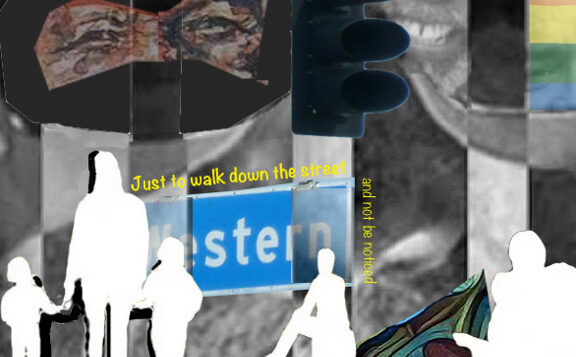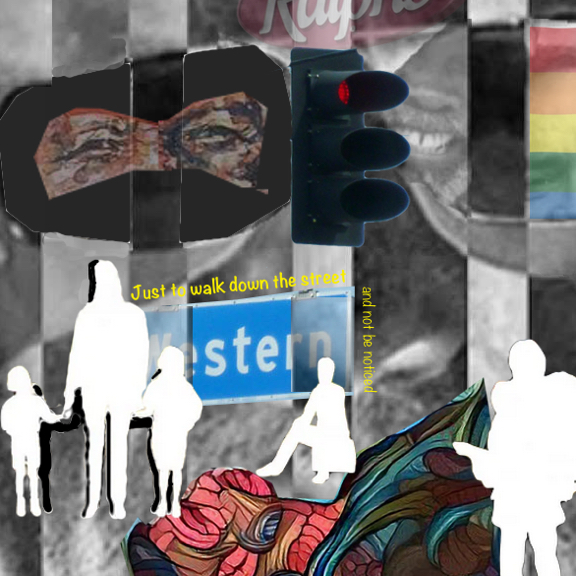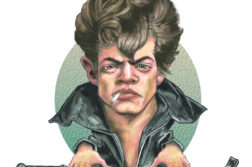THE TERM “PRIVILEGE”—white or otherwise—was not really in vogue when I spent nine months in the California prison system in 2004. And it certainly wasn’t a word that any of the men I served time with would have ever thought to apply to their experience while behind bars, or, for that matter, to any other part of their lives. In fact, it wasn’t until a few years ago that I realized that prison is where I learned about unexpected forms of privilege that I had no name for at the time. The first kind was extremely personal.
Gay Privilege
The phrase “gay privilege” may conjure images of velvet mafiosi clinking glasses at a bisexual billionaire’s swank Hampton digs, but I came to know an extremely specific and rare manifestation of it at the worst moment of my life. It was right after I had been arrested. After a week under suicide watch (a place to make you suicidal if you weren’t already), I was ushered in to see an avuncular officer who wanted to make sure I genuinely qualified for one of the three gay dorms at the Los Angeles County Jail, collectively known as “K-11.” I passed with flying colors, having no trouble listing a wide sampling of gay bars, one of which had even employed me as a bartender. As a first-time offender, he put me in the “least hectic” of the three dorms, 5100.
Once there, I soon discovered that a third or so of the inmates were nominally straight on the outside, but here had sexual or romantic interactions with other inmates who were trans (usually breast implanted but retaining male genitalia, so housed with the men) or temporarily adopting a female presentation as a survival strategy in prison. Some straight men had no such relationships but had learned how to lie their way into these protective dorms, because there were no racial politics there, and it was far safer than “gen-pop.” They preferred rumors of their sexual preference filtering back to their homeboys rather than being the potential target of violence by gang-bangers settling scores. I resented them, wondering if they had displaced actual queer boys who should have been here, but they weren’t the kind of men you challenged. Those of us who were HIV-positive had another layer of privilege in the dorms. We were given an extra peanut-butter and jelly sandwich at night, a legacy from the days when wasting was uncontrolled by drug cocktails. Most of us were indeed quite thin, not from HIV but from the crystal meth addiction that seemed to have brought almost all of us there in one way or another. I often gave my extra sandwich away to inmates who had no family or friends to put money on their books so they could buy food at the commissary. In exchange, a pair of them took it upon themselves to teach me all of the rules of the “mainline,” the designation for any state facility we were shipped to after sentencing. Any gay privilege I was lucky enough to have experienced immediately evaporated the second we left county jail and headed upstate, and from the bus ride on, you quickly hightailed it back into the closet. Prison culture imposed race as your primary identity, conferring supposed protection in case a riot “broke out”—which you were repeatedly warned could happen with minimal or no warning. My disclosure that I was incorrigibly nonviolent and could not imagine attacking anyone on the basis of race served to out me weeks before the question of whether I was gay was ever asked me directly. My assumed sexuality was enough to inflict semi-pariah status on me among the whites. When the Blacks saw me forced to eat at a separate table, several of them later told me they thought it “way harsh.” But it made them more receptive to communicating with me, as if my marginalization at least made my empathy for their experience as Black people more authentic. Weirdly, they also did not feel threatened by my gayness, as they honestly were convinced that homosexuality was a white disease they couldn’t get. Plus, I was generous with my instant coffee to all races, and this bought me favorable word-of-mouth. Some of the biggest, meanest-looking guys craving caffeine would come up to me quite diffidently and wonder if I could spare a “shot.” Here, also, there was a touch of retroactive gay privilege at work. I had gone to a majority Black high school, and the LGBT-heavy Drama Society was by far the most integrated club in school. From then on, I always had close Black friends and roommates. By the time other whites realized that maybe I was not going to give them gay cooties, I was documenting my life inside on a daily basis, sending my sister letters that she posted on a blog. If nothing in particular “happened” that day (which was rare), I would ask one of my neighbors about his life on the outside. (This was a powerful request for men who had never been asked to talk about themselves by anybody.) I eventually arrived at this universal question, which I remembered as the provocative premise posed once by the host of a Manhattan dinner party a lifetime ago. It went something like this: “If you couldn’t be you, and had to wake up another race, sexual orientation, or gender, what would be your preference to change first, second, and third?” So, using myself as an example, if I couldn’t be a gay white male, I might first want to be a gay Black man, then a straight white woman, and then a white lesbian, and so on. After the first responses, I realized that the answers could not escape our current context. It was all about race. I first asked several white inmates this question. Considering how they had initially treated me, I guess I was surprised that in every instance, they chose “gay white male” as their first option. (Upon further questioning, though, I realized they had done the equivalent of crossing their fingers when they answered. “I mean, I could still screw around with women on the side, right?” I would roll my eyes, and tell them they wouldn’t want to, but they couldn’t really grasp that.) But whether a gay man, a straight woman or a lesbian, their first three choices all kept their skin color. They wouldn’t entertain a fourth choice. Even in a game, they couldn’t imagine being Black. Or refused to. Posing the same question to the Black inmates, I was taken aback to hear virtually the same answers. Not a mirror image, but the same pattern. Their preferences were all “white”: first would be a straight man, then they generally preferred a white lesbian, followed by a gay man or a straight woman—but definitely always white. I suppose it was naïve of me to be surprised, but I was. I asked Phil, the soft-spoken young father who lived one bunk over from me, to elaborate: “It’s not an anti-Black thing, I’m a proud Black man.” The other Black guys nodded. “But being white sounds like a vacation to me.” More nods, then a thoughtful pause. “Just to walk down the street and not be noticed.”
Just to walk down the street and not be noticed. Ten words that pretty much explained the pernicious effects of racism in America. Ten words that would come back to me about a decade later, when suddenly “white privilege” was a phrase on everyone’s lips, causing an extraordinary amount of defensiveness among whites, above all those born and raised working-class, who could never be convinced that they had benefited from any innate advantage just by virtue of their skin color. It occurred to me that Phil had unwittingly hit upon what might be the most potent, but least acknowledged, manifestation of white privilege: anonymity. Later on, one-on-one, I asked him to give me an example. “Like shopping,” he said. “The grocery stores are better in white neighborhoods, but as Black man, I can’t relax. There’s always some white lady who pulls her purse a little closer when she passes me. Or an old man in a wheelchair who asks a white dude right behind me to reach for something on the top shelf, and I’m right there, and I’m taller! What does he think I’m gonna do, grab the can of tuna and knock him on the head?” When I first started writing about anonymous privilege, I contrasted my shopping experience with that of Phil. First off, even in my hardly upscale Hollywood neighborhood, I don’t have to go far to find a decent grocery store. And when I do, no one pays me any particular attention. I can mull over whatever is on my mind to my heart’s content. Most white people do this so routinely that it’s hard to see how it can be claimed as a “privilege.” I mean, don’t we all get lost in our thoughts all the time? Yes, but Black people operating in white-majority spaces don’t stay lost in them. Their consciousness is invariably impinged upon by the awareness that somewhere around them, a white person is reacting to their Blackness. Anonymous privilege, in this case, means the ability to experience privacy in a public place.
This public/private dichotomy is the defining aspect of the third kind of privilege I discovered in prison: the one that attaches to heterosexuality, specifically, public displays of affection. Two Latino inmates had turned the tables on me, and were asking me all kinds of questions about being gay, an interrogation most of us are fairly familiar with. How do you decide who’s the top and who’s the bottom? Have you ever done it with a woman? If you could take a pill to be straight, would you? (They had a lot of trouble believing that I wouldn’t.) Then one asked me if I ever held hands with a guy or kissed a man in public. Despite my urge to proudly respond that of course I did, the truth was that I only felt comfortable doing so in a gay bar or on a dance floor. “Why not?” asked the second guy. There was challenge in his tone, as if my reluctance to show affection in public disproved my earlier contention that I was not ashamed to be gay. “Because,” I explained, “let’s say you go to a restaurant with a girlfriend, and you hold her hand across the table while waiting for the food. And then at the end of the meal, you give her a kiss, not making out or anything, but a little more than a peck on the cheek.” I leaned forward, emphasizing my next words. “Absolutely no one in the restaurant notices—not the hand-holding, not the kiss. The moment of intimacy stays intimate between the two of you. But when I do exactly the same thing, even in the hippest restaurant in town, it’s noticed. No one may say anything, no one even really looks in any obvious way, but I can feel them, and that intimate moment is gone.” Heterosexual privilege, then, is the ability of straight people never to have to worry for a moment about other people’s perception of their sexual orientation. If they cross a line of vulgarity, any comment or sanction is about the behavior, not the urges behind it. Heterosexual privilege extends to the simple act of putting a photo of your spouse on your desk at work, or answering the question “What did you do this weekend?” with a casual mention of your in-laws visiting. Straight privilege means never having to introduce your life partner as your “friend,” for fear of being accused of talking about your sex life because you used a designation that means you sleep together. (It’s amazing how many heterosexuals will argue that “husband” and “wife” do not precisely convey that very information, declared publicly to the world, no less, in elaborate celebratory ceremonies called “weddings.”) This is not new information, obviously, to anyone reading this. But it is eye-opening to most heterosexuals, to whom it never occurred to see these as privileges. My favorite question is to ask them to share about the time they had to sit their parents down and say, “I’ve made a decision to be straight.” Only then do they realize that this is exactly what we have to do, why a response like “You can’t possibly know that about yourself yet” is so offensive. (I heard that one myself when I came out, but, in my parents’ defense, it was in 1976. Back then, any response that wasn’t “pack your bags and get out” was considered enlightened.) So what’s the point of expanding our vocabulary about the categories of privilege? The point is people like Sylvia, a Guatemalan trans woman with whom I shared a court date once. We spent an entire day together in the bowels of the Beverly Hills Courthouse, traveling back and forth to the Twin Towers on those buses with the caged windows that Angelenos see on Melrose Avenue during rush hour. Her biography was as gritty as they come, especially as she seemed to be taking the fall on a gun charge for the same man who had financed her breast implants, and doing this for him seemed to be her sole hope of getting the rest of her transition paid for. It’s hard to think of a demographic group with less privilege than undocumented trans women of color, and it is no coincidence that they experience one of the highest murder rates in America. It seems to me that when every single group with more power and status in society than Sylvia can be made to recognize it, the more likely they will be to unlock their empathy and understanding, so that, one day, perhaps the only privilege we all share is that of being human.Anonymous Privilege
Heterosexual Privilege
Mark Olmsted, author of Ink from the Pen: A Prison Memoir, will be the subject of three episodes of the podcast Everything Is Stories in spring 2024.






